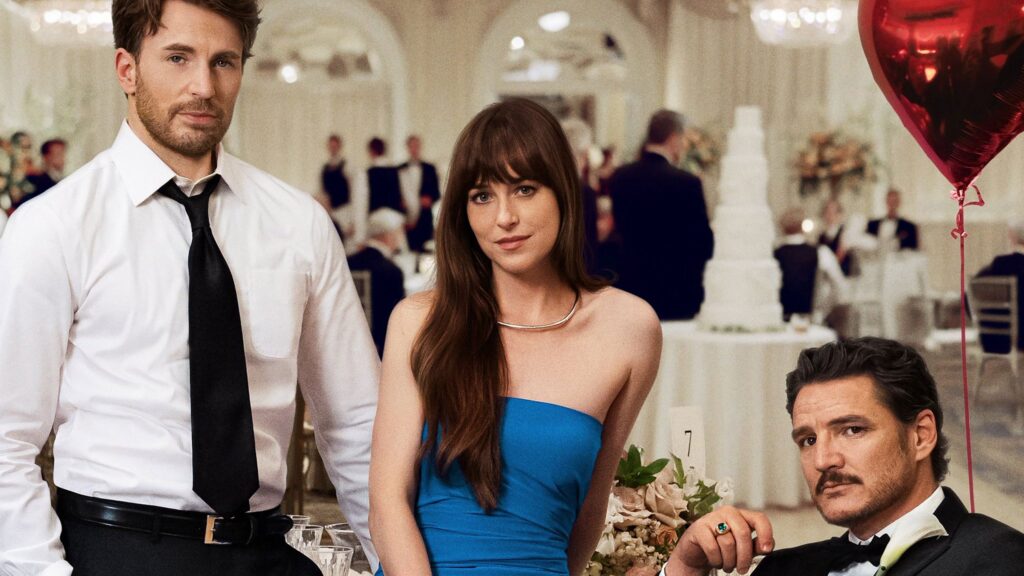
As I watched Celine Song’s Materialists in a suburban theatre amid a crowd of unusually giggly young women, a strange question erupted in my mind: When was the last time I truly hated someone? The film, after all, is about love – every possible kind of it. It questions why we no longer love ourselves, let alone love another person with all our might. If not love, are we even capable of creating reciprocal energy anymore? Are we chasing impossible goals, or are we planning to outsource emotions to an AI app? Song answers, in the most unsubtle way possible, that it’s not hate but materialism that stands as love’s true adversary today. In what is (kind of) a triangular romance between Lucy, John, and Harry, Materialists throws a barrage of self-help mantras at us.
To begin with, the film is built on a flawed notion: that love is impossible to find in the era of dating apps. Lucy works for a high-end dating agency catering to wealthy, middle-aged clients. Think Bumble, but with a personal shopper thrown in. Honestly, I didn’t find the setup problematic as it reflects our times. It serves individuals who are either too busy or too tired to swim in the vast dating pool.
When Song signals to Gen-Z and millennial viewers that dating is now an industry and no longer a social interaction, it’s like saying water is wet. Or that Chris Evans is hot. Materialists wants to capture the spirit of our times, yet somehow feels stuck in another era. How do we reconcile 1980s-style idealism with an era where couplets are generated by AI? It also feels inaccurate to suggest the world is fully leaning into materialism with no room left for real love. Does Song believe we don’t have romances like An Affair to Remember anymore? Perhaps she needs a closer look at the world around her.
Delving deeper, Lucy’s job is not as rare as it seems, even in developing economies. Just that most days, it doesn’t involve wearing a slinky gown or getting hit on by Pedro Pascal. The duo’s chance encounter has its spark. True to rom-com cliché, they are opposites who attract—or at least attempt to connect. The third angle is John, a struggling actor who fails to earn our sympathy due to his reckless lifestyle. It almost feels justified when Lucy confesses to Harry that wealth is a major criterion in choosing the man she wants to settle down with.

Materialists presents a concept of love that’s meant to last forever. It talks about love being easy, and marriage being a deal that can end when it no longer works. These are compelling ideas, articulated well. But Harry’s wealth is too much of a stereotype to create real tension. Lucy isn’t a materialist. But is it wrong for her to ask her boyfriend to pull his weight? A decade later, Lucy finds John in the same place she left him. And somehow it’s an anomaly if Harry signs a cheque without checking the expenses?
The film works best when it’s setting up its world. Sophie, a supporting character, goes on various dates and brings in some much-needed intrigue. She’s far more interesting than Lucy. I found myself more invested in what happened on Sophie’s dates than in why Lucy, John, and Harry behave the way they do. Zoe Winters brings such warmth to Sophie that it’s baffling why suitors aren’t lining up. Then again, the idea of “knocking at someone’s door” has gone obsolete in today’s dating culture. Adore’s clientele, with their bizarre demands, bring out the film’s best humour.
Things spiral when Lucy reacts strongly to what her boss deems a normal occurrence in their field. Her guilt is puzzling – she’s done everything in her power to look out for her clients, and her employer doesn’t blame her. Sophie’s nervous energy also raises questions: Should every HR manager feel responsible if a hire makes a bad call? The film seems to imply that matchmaking is a shady, borderline scammy profession. But how is it different from any other service-based job? Lucy is sensitive and ethical. She didn’t climb the ladder by lying, cheating, or stepping on others. Her success is hard-earned, unlike Harry’s, which came rather easily.
I also couldn’t quite figure out why the film is called Materialists. John is poor and lacks the intent to live a better life. Lucy, despite expressing her desire for a rich partner, constantly reminds the mega-rich Harry that they’re not a match, even though she could have spent a lifetime with him in luxury. Even Harry ends up choosing Sophie, despite having the wealth and social clout to pursue someone younger and more glamorous. Yes, the film does explain why he wasn’t successful with women in the past. But here’s the thing: love has never been easy to find in any era. So why blame technology and paradigm shifts?
I did appreciate that Song doesn’t romanticize John’s poverty. At the same time, Lucy’s desire for a better life is valid. A film that imagines growing old together in a nursing home can’t also pretend that sharing street food in your late thirties is some timeless romantic ideal.
ALSO READ: ‘Past Lives’ review – Celine Song’s meditative romance is a contemporary classic
As the writing shifts from curious to absurd, Materialists is held together by Song’s visual grammar, camera choices, and the performances. I loved the classic staging of scenes where lovers look at each other longingly from a distance. The subtle background score adds a welcome softness. Clearly, this film isn’t built for TikTok or Instagram Reels.
Among the cast, Pedro Pascal gets the best material and some of the sexiest moments. The luminous Dakota Johnson dominates nearly every frame, but it’s hard not to wish Lucy (and her writer) were a little less muddled. Chris Evans sheds his Captain America persona to play the penniless New Yorker, though his character works better as an idea than as a person.
When I walked out of Celine Song’s debut Past Lives, I wanted to rewatch it in a cinema, just to soak in her clarity of vision. There, she understood the universe she was working with. In Materialists, both the filmmaker and her characters feel as confused as Adore’s clients. They don’t seem equipped to navigate Gen-Z culture, with its new rules and shifting values. The film clings to outdated ideas of love, offering advice straight from a 1990s self-help manual, and from those Sandra Bullock or Meg Ryan rom-coms that always ended with, ‘Love was around me all along; I just didn’t realize it.’
As it concludes, Materialists reduces love to a box-ticking exercise – the very thing it accuses Lucy of doing. Irony dies a slow, glamorous death. So does our patience, as we’re forced to endure dated epiphanies like, “You’re not ugly, you’re just poor.”
Rating: ★★ 1/2

